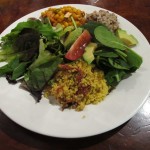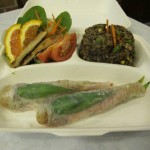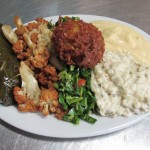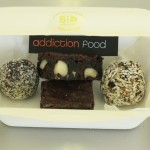About
The VegPledge Challenge is about empowering individuals to make one of the most significant personal contributions a person can make to the green cause—making sustainable food choices.
VegPledge encourages individuals to consider ways of reducing the environmental impact of their food habits and to commit to one or more of the 15 pledges (or their own) on the VegPledge.org site for the two week period of the VegPledge Challenge commencing 27th September 2010. The challenge finishes on Sunday the 10th October 2010 with a carbon friendly picnic in Centennial Park, coinciding with the 350.org Global Work/Party 10/10/10 campaign. We’ll be setting up in Centennial Park (at Lachlan Reserve, south of Dickens Dr) with picnic blankets laid out in a 350 configuration specifically for our event participation photo. We hope you’ll join us! We encourage use of sustainable transport to get to the event, and if you have a bike you can cycle to Centennial Park along with the Keep it Wheel cycling teams.
What is the 10/10/10 Global Work/Party campaign?
It’s a global call for action where citizens around the world work together to reduce carbon emissions in their communities. By holding climate solution work/party events on the 10/10/10, communities will send a clear message to political leaders to take notice and also get to work on climate change legislation which supports carbon reduction. There are over 3100 Work/Party events planned in more than 160 countries for the 10/10/10, and we’re one of them!
What is 350.org?
350.org is an international campaign that’s building a movement to unite the world around solutions to the climate crisis—the solutions that science and justice demand. 350 parts per million is what many scientists, climate experts and progressive national governments are now saying is the safe upper limit for CO2 in our atmosphere; we are currently well above this at 392ppm and still rising. Visit www.350.org for more information about the work of this campaign.
Brought to You By…
VegPledge/VegOut is brought to you by Donna Frith, Tim Moore, Nikki Durr and Bob Ratnarajah. Like many great things it all started with the meeting of like-minded individuals interested in exploring an idea. After discovering the 350.org Global Work/Party campaign online, Donna started mulling over the idea of a picnic event focusing on the difference an individual can have by making sustainable food choices. At the Walk Against Warming Sydney event she pitched the idea to fellow members of the Sydney V Star group, founded by Bob Ratnarajah for those interested in vegetarian, vegan and raw food lifestyles. Nikki, Tim and Bob got on board and the brainstorming coffee session which followed set VegPledge/VegOut on it’s course. The time, energy and hard work since has evolved the campaign and event to what it is today.
Pledge
Take a closer look at the food choices you make everyday—what impact on the environment are you having? Join the VegPledge to make it a positive one. VegPledges cover everything from what you eat, to how it’s produced and how you purchase it, and all offer each of us an opportunity to make a personal difference which we can choose to continue making every day.
Some things take more effort than others so consider what commitment you are willing to make and sign up for as many pledges as you are willing to do. Make sure they are actions you are not currently doing—the idea is to make positive changes to your food habits that will reduce your carbon footprint. Other food related pledges can also be submitted, the opportunities are endless––we all have potential to improve.
We invite you to choose the pledges that you would like to make by browsing the list below and clicking the “Make This Pledge†link next to any that you can commit to. Once you’ve chosen your pledges, click “Share†in the header above to publish your pledges to the web site. There, you’ll have a chance to add your comments or write your own pledge and subscribe to our announcement list for future updates.
You can also see the pledges shared by others.
| Pledge | What | Why | Resources |
|---|---|---|---|
|
I’ll refill a reusable drink bottle instead of buying a new one
|
Lightweight metal bottles are available from many places. Why not buy one, and reuse this for your water replenishment? | It is estimated that 200 billion bottles are used each year, globally. According to The Daily Telegraph, “Australians’ bottled water use last year was responsible for more than 60,000 tonnes of greenhouse gas emissions—the same amount 13,000 cars generate in 12 months”. Further, if you use one reusable bottle for a year, you will save a small fortune! | |
|
I’ll use reusable containers not foil, plastic or paper wrap
|
Whether in your home or when getting take-away, store your food in containers that can be washed and reused over and over, not just thrown into a landfill after one use. | Australia produces more than 1.3 million tonnes of plastic every year – more than 71 kg for every person. Cling wrap is a plastic that poses a serious environmental threat as it’s widely used but not recyclable in Australia due to machinery incompatibility. The plastic is made from polyvinylidene chloride (PVDC) or polyvinyl chloride (PVC) which take hundreds of years to degrade. PVC also contains toxic chemical additives that leach out of the plastic into food. Although aluminium foil can be recycled it is commonly overlooked and thrown in the bin – if you use it, make sure you recycle it, or save yourself the cost and reuse a container instead! | Food Wraps at biome |
|
I’ll use my own shopping bags
|
All it takes is a little forethought to take some canvas shopping bags with you to the grocery store, and carry a small fold-up one in your bag for unexpected situations. You can do that! | Aussies use almost 7 billion plastic bags a year – those that end up in landfill take hundreds of years to decompose, the rest end up in the ocean killing marine life and contributing to the Great Pacific Garbage Patch. | |
|
I’ll reduce my food miles and buy local
|
How green is your plate? How far has your food travelled to be on your plate? The further it has travelled, the bigger the carbon footprint. |
Consider that to buy packaged food, the food is sourced from all over the place, the packaging from another place, the packaged food is then distributed to outlets, and you go to the outlets to buy the food. Research has shown that an average Melbourne shopping bag has travelled 70,000km! |
What Is Food Miles? |
|
I’ll eat more veggo meals and less meat
|
Science has proven that one of the most effective ways to address global warming is to reduce meat consumption; in fact reducing meat and animal product consumption is the most significant thing an individual can do to reduce their carbon footprint. | According to a report published by the United Nations Food and Agriculture Organization, the livestock sector generates more greenhouse gas emissions (18%) than transport. Add to that significant land occupation and degradation (30% of the earth’s entire land surface for pasture, and 33% of the global arable land producing feed for livestock), water consumption (beef and dairy production are the highest water consumers in Australia), and huge emissions of Methane (which is over 20 times as powerful as carbon dioxide at trapping heat in our atmosphere) and Nitrous Oxide (which is 300 times more potent than carbon dioxide and 65% of total worldwide emissions comes from meat, egg, and dairy industries). | |
|
I’ll choose sustainable seafood options
|
How would you feel to live in a world without fish? Is the seafood you buy sourced from sustainable fishing practices? |
WWF report 90% of large fish have been fished out. 1/10 of the world catch is waste and includes dolphins, turtles and seas birds. The mouth of the largest trawling net is big enough to catch fish which would fill 13 x Boeing 747 aeroplanes. |
|
|
I’ll start a veggie garden and reap what I sow
|
Whether you live in a flat or a house you can grow your very own vegetables. | Think about how much energy is used in commercial agriculture, then add on storage, transport, refrigeration and the unconscionable amount of food that is discarded when it can’t be sold before it goes bad. It’s clear that there are many benefits to cutting out all of this waste. You also get fresher and healthier vegetables because you know what goes into your garden and you can eat fruits and veggies straight off the vine––YUM! | The Vegetable Patch |
|
I’ll take a reusable mug when I buy take-away
|
You might prefer coffee, tea or hot choc, but if you’re like a lot of Aussies, you probably drink at least one of these each morning. Bringing your own cup to the café reduces waste and makes a great statement to the other patrons and staff. | It is estimated that Australia disposes of approximately 1 billion take away coffee cups annually. This equates to 7 million kg of solid waste in Australian landfills and is the equivalent of enough energy to power 3,400 homes. Most of these cups can not be recycled due to chemicals in the inside coating and dyes. | KeepCup |
|
I’ll buy organic products
|
Support your local organic food sellers and enjoy food that is grown naturally with minimal impact on the environment. It’s mighty delicious to boot. | Organic farms don’t release synthetic pesticides into the environment, they’re better at sustaining diverse eco-systems, and produce less energy and less waste. | Australian Organic Food Directory |
|
I’ll plan ahead and save a trip
|
Uh oh, I forgot to buy bread today! Should I hop in the car to go to the grocery for just one or two items? Consider whether you can batch up your shopping trips to get more done with less driving. | On average one litre of petrol releases 2.4kg of CO2. Keep that in mind the next time you hop in the car—is what you’re going out to get really worth it? Write a shopping list to make sure you remember everything in one trip. | |
|
I’ll purchase products with minimal and sustainable packaging
|
Buy fresh food and put them directly into your shopping cart or reuse plastic bags from your previous trips. Avoid individually packed items and package children’s lunch boxes using reusable containers to reduce waste. Choose glass over plastic and check your local council’s web site for restrictions on other materials. | Is the packaging necessary or is it flashy and designed to increase sales? In today’s throwaway culture, each Australian is generating an estimated 200kg of packaging waste every year. Unfortunately, not all of that is recycled – about 1.9 million tonnes of it ends up in Australia’s landfills. Use your purchasing power and avoid products with excessive, unneccessary packaging. Buy fresh produce that comes in it’s own colourful skin rather than a wrapper and choose products that come in recycled and recyclable or biodegradable materials. | |
|
I’ll use sustainable transport to do my shopping
|
Around a third of the car trips made in Sydney are less than 3 km and more than half are less than 5 km. Some of these can easily be done on foot or bike, so if you’re only going out for bread or an arm-full of shopping, reap the benefits of fresh air, some excercise and no parking hassles – walk, cycle or get public transport to the shops. Ditto for that morning coffee or dinner out with friends. | When comparing greenhouse gas emissions, walking and cycling are the big winners with zero emissions. Light rail, diesel buses and ethanol E10 buses generate 16g, 22g and 19g carbon dioxide (CO2) per passenger km respectively. A 4WD with one passenger emits half a kilo and a medium car emits 300g. | |
|
I’ll do more cooking at home
|
Restaurants and convenience foods are handy in times when you’re feeling busy (and when are we not?) but require a lot of energy to store, package and prepare. Some good, old-fashioned home cooking lets you put your meals back into your own hands. | When you cook at home you are more aware about what you’re eating. You can make your own choices about what you buy and take into consideration where a product is produced, how far it has travelled, what chemicals and additives it has in it, whether it’s been genetically modified and what packaging it’s in. You limit waste by cooking only what you need and you can recycle your packaging and compost your waste. Not to mention you can vote with your dollar by only supporting brands/consumables with sustainable practices. | |
|
I’ll grow my own herbs
|
Many herbs are easy to grow and growing your own saves a lot in the wallet. They can be used in the landscape design of a pretty garden. The greatest benefit of using herbs in your food, they taste great and they are a good source of nutrition. | They are a great addition in your cooking and once you make a great spaghetti sauce with your fresh home made basil, you’ll never want the bottled stuff again. | |
|
I’ll support venues with sustainable food menus
|
A growing number of restaurants and cafés are popping up that put a serious focus on sustainability. These progressive venues need our help and support. Seek them out for a delicious way to make a difference. |
Thanks for selecting your pledges; click SHARE to register and see who else has pledged
Picnic
Part of banding together as a community and getting to work on practical solutions to the climate crisis is celebrating our achievements. The VegOut picnic event on Sunday 10/10/10 at Centennial Park will be an opportunity for pledge participants and friends to relax in a beautiful environment, sharing our VegPledge experiences and eating a yummy climate friendly picnic.
With an emphasis on sustainable food we welcome BYO organic, vegetarian, vegan, local and home made picnics.
Veg Pack lunch boxes are available for pre-purchase until the 8th of October. There are four savoury varieties and one sweet pack to choose from, prepared by four of Sydney’s wonderful sustainable food venues.
Please bring your own beverages in reusable or recyclable containers.
Cyclists, check out Keep it Wheel, another 10/10/10 event organised by our friends at Digital Eskimo. Starting at 10 am they’ll be riding through Sydney to celebrate our new cycle ways and will make their way to Centennial Park to join us for the VegOut picnic. Take a look at http://keepitwheel.org/ for details.
The details:
When:
Sunday 10th October 2010
Time:
12 noon ’til 4
Photo op:
To further celebrate our involvement in 350.org’s Global Work/Party campaign and as a reminder of the cause, we will be configuring our picnic blankets in a 350 format and attempting to take a photo for the 350.org website.
Where:
Sydney’s Centennial Parklands (at Lachlan Reserve, south of Dickens Dr)
View VegPledge VegOut in a larger map
Veg Packs
Make the VegOut a truly relaxing experience and have your picnic prepared for you. Pre-purchase a Veg Pack lunch box before Friday 8 October 2010 and enjoy a delicious, climate friendly lunch assembled by one of Sydney’s wonderful sustainable food venues.
Choose from the delicious Veg Pack lunch boxes below, all vegan. Once you’ve added a Veg Pack to your shopping cart, you’ll be able to update the quantity and check out with PayPal below.
Veg Packs are only available if you order in advance—we won’t have extras on the day of the event—so be sure to get your order in soon!



